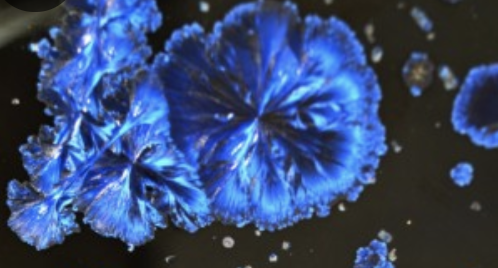Crystalline glaze - 7.5.2020
- Ruby
- May 7, 2020
- 2 min read
Crystalline glaze with Anna Barlow

Origin:
-Crystals in nature: dolomite, quartz, pyrite -Formation of crystal: when water was completely saturated with one chemicals, crystals forms to maintain stability -Only 2% of clay in crystalline glaze vs 20-25% in normal glazes Seeding crystals: -growing crystals on clay -Grog on clay that lets crystals collects around -ilementite: mixture of iron and titanium, grows yellowish crystals -Bone/ash could also do some effect

Types of crystalline glazes: -Willemite: zinc silicate crystals (most common, blossom like pattern) -Titanite: titanium silicate crystal (spiky texture) -Wollastonite: calcium silicate crystals (spotty) -Granite crystals: if you add more clay (test with 5% more) -Aventurine: Take out zinc and replace with iron (High in iron(20-35%), slow cooling, glittering effect)
Finish: -Fluidity: take clay out of glaze to increase fluidity(stability of course will be lower) -Matte: usually are glossy but could be matte if added barium
Colours in crystalline glazes:
-Zinc oxide: white
-Cobalt: blue, strongest attraction, Immediately sucks in crystals leaving oxides behind
-Nickel: bright yellow but impurity of nickel make crystal cobalt
-Iron: pale amber-ish yellow
-Manganese dioxide: greyish purplish red
-Copper: green, weakest attraction
Firing cycle:
-Temperature: Highest 1100 then goes down naturally to 190-110, soak in low temperature to grow crystals, could be hours
-Try in smaller kilns for test, then middle of biggest kilns for more cooling time
Application:
-Brush stroke isn’t a worry because of the high fluidity
-Falls easily so need paper paste or gum arabic to help stick on piece
-needs drip trays and test in a row, test one effect at a time
Food Safety:
-Not safe, can’t pass leach test
-low stability and high thermal expansion in glaze
-Handles outside furnace should be fine, just not the food side

Try out a glaze project!
-Make a solid plan and try out some glaze recipes you really enjoy
-Consistent application
-consistent clay
-make a hypothesis
-record keeping: does it settle in bucket? Does material decompose overtime? Position the piece was fired in kiln? Thickness of applied glaze?


More to look at:
-youtube: how to grow bismut crystal (bismuth are often used in Enamels/flux/lead)
-Google: Artist/ceramicists growing crystals on sculptures


























Comments